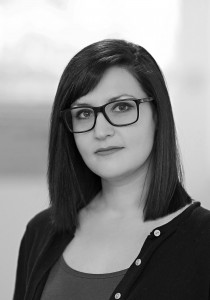- Deepshikha Mishra Ina Nikolaeva graduated from Rutgers University with a PhD in Cell Bio and Neuroscience, where she studied role of mtor pathway in brain injury and diseases for her thesis. Currently, she enjoys her role as an Associate Scientific Director at Healthcare Consultancy Group. She was a senior editor and lead blogger for the iJOBS blog and actively participated multiple programs organized by iJOBS. She shares her professional journey with us through this interview. 
- What have you been up to since graduating? Can you tell us about your job?
Following graduation, I started out as a medical writer at a medical communications company three years ago. Since then, I’ve changed companies once and am now an Associate Scientific Director at Healthcare Consultancy Group. I still love the medical communication field and plan to stay in it for the foreseeable future.
- What got you interested in this field?
I have always enjoyed and have been reasonably skilled at writing and communicating. Even though at the time of graduation, while I did not want to pursue bench work any further, I also wanted to stay close to cutting edge science. Once I discovered the medical communications career path, I looked no further ?
- Can you tell us what your job search experience? What were some obstacles you faced and how did you overcome them?
Some of my main challenges involved transitioning from running around in the lab to sitting at a desk. However, I always enjoyed the writing part of lab research and so I did not have much difficulty transitioning to doing that fulltime. The other key difference – though I did not necessarily perceive it as a challenge – is that medical communications is inherently a client-based service. Although I gained many communication skills while working towards my PhD, learning to provide a service for a client was a completely new experience.
- How is your path going so far? What are some of the differences and similarities between your current position versus your research life at Rutgers?
The first difference is that my research at Rutgers was in neuroscience, using a mouse as a model organism. My current position now involves transitioning to oncology and working with data from human clinical trials. It is a whole different beast, but there is plenty of opportunity to catch up and get comfortable with the new scientific areas before taking on projects independently. I continue to enjoy my work every day!
- What was your involvement with iJOBS, and is there anything specific that you were able to take away from the program events that helped you secure a position?
I was very involved with iJOBS and was one of the founding writers for the iJOBS blog. Eventually, I took over as the main editor as well and kept that task up for several months following my graduation. The iJOBS’s event I found the most useful was the SciPhD program. It was extremely helpful in giving us a glimpse of what life outside of academia entails, as well as providing very useful advice for resume writing, interviewing, and other useful skills. Larry and Randy specifically gave me tips on what companies are looking for at each stage of the interview process, and my resume is STILL in the format found in their manual!
- How did you use skills that you learned during your graduate school career to transition into your current role? Were there any specific activities that you did during graduate school that helped you gain these essential skills?
My PI always let me write my own papers and encouraged me to take every opportunity I can to present my research in talk and poster form. She also always emphasized the “story-telling” element of such presentations. When it came time to interview, these skills were extremely important, as this is exactly what interviewers look for in the presentation you give them on-site. Additionally, my work on several blogs during this period was a clear indicator that I participate in writing activities even outside of the lab. I think all of these activities put together demonstrated both my skill and devotion to writing.
- Do you have any general advice for current PhD students preparing for the next step in their careers?
I think the most important thing is to really think about which day-to-day activities you enjoy the most and least about your current position. You should try to find a career path that fits within those parameters. Thank you very much Ina for the interview. It was so lovely knowing you and learning about your journey. I am sure the information you shared with us is going to help so many of us. Good luck. Edited by: Eileen Oni and Tomas Kasza